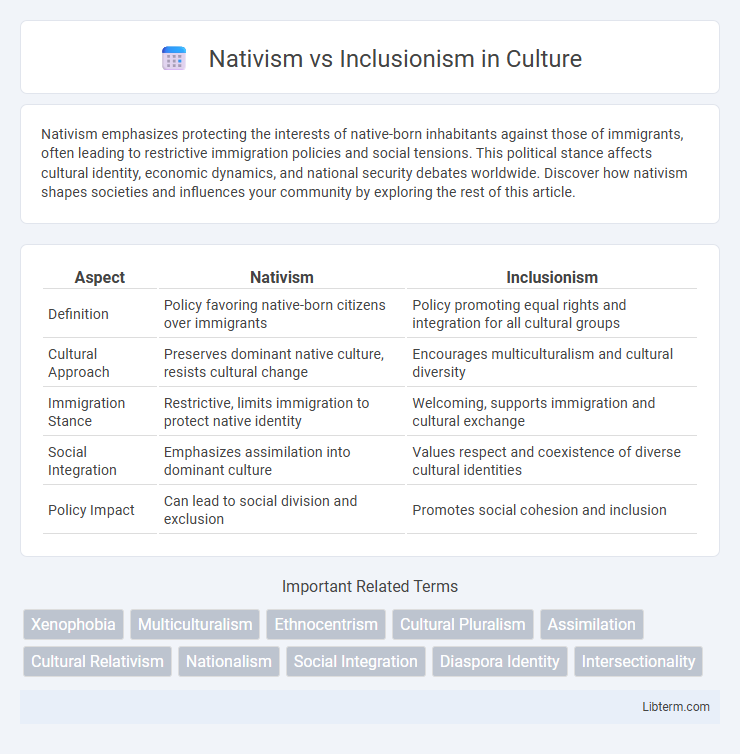Nativism emphasizes protecting the interests of native-born inhabitants against those of immigrants, often leading to restrictive immigration policies and social tensions. This political stance affects cultural identity, economic dynamics, and national security debates worldwide. Discover how nativism shapes societies and influences your community by exploring the rest of this article.
Table of Comparison
| Aspect | Nativism | Inclusionism |
|---|---|---|
| Definition | Policy favoring native-born citizens over immigrants | Policy promoting equal rights and integration for all cultural groups |
| Cultural Approach | Preserves dominant native culture, resists cultural change | Encourages multiculturalism and cultural diversity |
| Immigration Stance | Restrictive, limits immigration to protect native identity | Welcoming, supports immigration and cultural exchange |
| Social Integration | Emphasizes assimilation into dominant culture | Values respect and coexistence of diverse cultural identities |
| Policy Impact | Can lead to social division and exclusion | Promotes social cohesion and inclusion |
Understanding Nativism: Definition and Origins
Nativism is a political and social ideology favoring the protection of native-born citizens' interests over those of immigrants, often manifesting as opposition to immigration and multiculturalism. Originating in the 19th century United States amid increasing immigration waves, nativism was driven by fears of cultural dilution, economic competition, and perceived threats to national identity. This ideology emphasizes preserving established cultural norms and restricting the influence of foreign-born individuals on society.
Core Principles of Inclusionism
Inclusionism emphasizes the value of diversity and equitable participation by advocating for policies that support multiculturalism, equal opportunity, and social integration. Core principles include promoting mutual respect, embracing cultural differences, and ensuring that marginalized groups have access to resources and representation. This approach fosters social cohesion and leverages the benefits of diverse perspectives for community development and innovation.
Historical Context: Nativism and Inclusionism in Society
Nativism emerged prominently in the late 19th and early 20th centuries as a reaction against waves of immigration, driven by fears of cultural dilution and economic competition. Inclusionism, in contrast, has roots in civil rights movements and democratic principles advocating for the acceptance and integration of diverse populations. The historical context of these ideologies illustrates how societal values shift between protecting established cultural identities and embracing multiculturalism for social cohesion.
Key Differences between Nativism and Inclusionism
Nativism emphasizes prioritizing the interests, culture, and rights of native-born inhabitants over immigrants, often advocating for stricter immigration controls to preserve national identity. Inclusionism promotes embracing diversity through policies that support integration, equal rights, and cultural acceptance of immigrants within society. Key differences lie in nativism's focus on protecting established cultural norms versus inclusionism's emphasis on open, inclusive social frameworks that encourage multicultural coexistence.
Social and Political Impacts of Nativist Policies
Nativist policies often lead to social fragmentation, heightening tensions between immigrant communities and native-born populations. Politically, such policies fuel the rise of nationalist movements and contribute to polarized legislative agendas focused on immigration restriction. These impacts diminish social cohesion and can undermine democratic institutions by prioritizing exclusion over multicultural integration.
Benefits of Inclusionism in Diverse Societies
Inclusionism fosters social cohesion and economic growth by embracing diverse cultural perspectives, which enhances innovation and problem-solving capabilities. It promotes equal access to education, employment, and civic participation, reducing social inequalities and fostering mutual respect among community members. Studies show that inclusive policies improve mental health and societal well-being, creating resilient communities that thrive in a globalized world.
Nativism vs Inclusionism in Immigration Debates
Nativism in immigration debates emphasizes prioritizing native-born citizens' interests, advocating for strict border controls and limited immigration to preserve cultural identity and economic resources. Inclusionism supports open immigration policies that promote diversity, multiculturalism, and equal opportunities for immigrants to contribute to societal growth. The tension between these perspectives shapes policy decisions, balancing national security concerns with humanitarian and economic benefits of immigration.
Education and Integration: Approaches from Both Sides
Nativism in education emphasizes preserving a fixed national identity by promoting curricula centered on native history, language, and cultural values, often restricting immigrant influence in schools. Inclusionism advocates for integrating diverse cultural perspectives within educational settings, encouraging multicultural curricula and support programs to facilitate immigrant students' social and academic integration. Both approaches impact social cohesion and identity formation, with nativism prioritizing assimilation and uniformity, while inclusionism fosters pluralism and mutual respect in diverse societies.
Case Studies: Global Examples of Nativism and Inclusionism
Case studies of nativism include the immigration policies of the United States under the 1924 Immigration Act, which severely restricted entry from non-European countries, and Brexit in the United Kingdom, driven by concerns over national sovereignty and anti-immigrant sentiment. Inclusionism is exemplified by Canada's multicultural policies that actively promote immigration and integration through programs like Express Entry and the Canadian Multiculturalism Act, fostering social cohesion. New Zealand's Treaty of Waitangi settlements demonstrate inclusionism by recognizing indigenous rights and incorporating Maori perspectives into national governance.
The Future: Balancing Nativist Concerns with Inclusive Values
Balancing nativist concerns with inclusive values requires careful policy design that protects national identity while promoting diversity and social cohesion. Future approaches must address economic and cultural anxieties driving nativism by fostering dialogue and equitable opportunities for all residents. Implementing inclusive education and community engagement programs can help reconcile differences and build a shared sense of belonging.
Nativism Infographic

 libterm.com
libterm.com